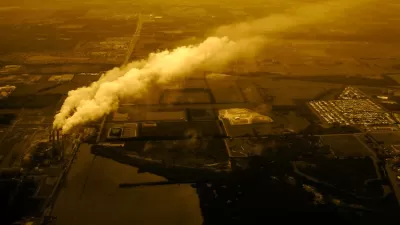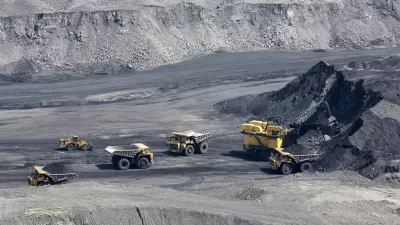An appeals court on Friday granted the Trump Administration's request to suspend lawsuits on the Clean Power Plan, dealing a major blow against President Obama's signature climate initiative to reduce carbon emissions from existing plants.

With the signing on March 28 of the president's executive order, "Promoting Energy Independence and Economic Growth," the rollback of the Clean Power Plan was set in motion. The first step was to "get permission from the U.S. Court of Appeals for the D.C. Circuit, where the rule is tied up in litigation, to revisit the matter," notes the post on the signing of the order.
That critical step was taken by the court on April 28, when it stayed "litigation against the Environmental Protection Agency rule for 60 days," report for The Washington Post.
Opponents of the Obama-era rule, which sought to impose the first-ever federal limits on existing power plants, hailed the decision.
“The D.C. Circuit has done the right thing,” David Rivkin, a constitutional lawyer who represented the 28 states that sued over the regulation, said in an interview. “It is indeed the death knell of the Clean Power Plan.
According to statements in the article by the Sierra Club and Environmental Defense Fund, both parties in the court case supporting the rule, all is not lost.
Eilperin and Dennis note some good news for the environmental community on a different regulation affecting power plant emissions. They note that the March 28 executive order also instructed EPA to rewrite the 2015 rule known as the “Carbon Pollution Standard for New Power Plants" and for Attorney General Jeff Sessions to ask the D.C. Circuit to suspend litigation against that rule.
However, since the Supreme Court's emergency order in February 2016 did not suspend that rule, it remains in effect.
Correspondent's note: As Planetizen's editor posted in February, "Changes in Environmental Policy Already Apparent on the EPA Website," you, the reader, may soon become aware of them if you haven't already.
For example, EPA's link for the aforementioned "Carbon Pollution Standard for New Power Plants," introduced in 2013 and also described here, now directs readers to the March 28 Executive Order, which calls for a review of the Clean Power Plan, even though the rule remains in effect, as The Post's reporters explained.
Sadly, Planetizen may need to rely on outside sources, like Wikipedia or the Center for Climate and Energy Solutions (C2ES) – "an independent, nonpartisan, nonprofit organization working to forge practical solutions to climate change," for explanations of EPA rules, such as the Carbon Pollution Standard for New Power Plants. But be forewarned, because links within C2ES' description direct readers to EPA sites that have been altered.
FULL STORY: Court freezes Clean Power Plan lawsuit, signaling likely end to Obama’s signature climate policy

Planetizen Federal Action Tracker
A weekly monitor of how Trump’s orders and actions are impacting planners and planning in America.

Maui's Vacation Rental Debate Turns Ugly
Verbal attacks, misinformation campaigns and fistfights plague a high-stakes debate to convert thousands of vacation rentals into long-term housing.

Restaurant Patios Were a Pandemic Win — Why Were They so Hard to Keep?
Social distancing requirements and changes in travel patterns prompted cities to pilot new uses for street and sidewalk space. Then it got complicated.

In California Battle of Housing vs. Environment, Housing Just Won
A new state law significantly limits the power of CEQA, an environmental review law that served as a powerful tool for blocking new development.

Boulder Eliminates Parking Minimums Citywide
Officials estimate the cost of building a single underground parking space at up to $100,000.

Orange County, Florida Adopts Largest US “Sprawl Repair” Code
The ‘Orange Code’ seeks to rectify decades of sprawl-inducing, car-oriented development.
Urban Design for Planners 1: Software Tools
This six-course series explores essential urban design concepts using open source software and equips planners with the tools they need to participate fully in the urban design process.
Planning for Universal Design
Learn the tools for implementing Universal Design in planning regulations.
Heyer Gruel & Associates PA
JM Goldson LLC
Custer County Colorado
City of Camden Redevelopment Agency
City of Astoria
Transportation Research & Education Center (TREC) at Portland State University
Jefferson Parish Government
Camden Redevelopment Agency
City of Claremont




























